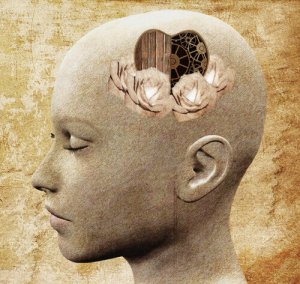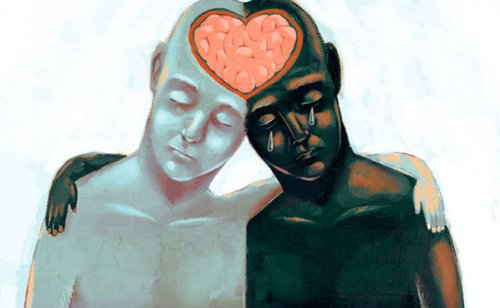Emotional and Rational Empathy: How Do They Manifest Themselves in Our Brains?

One of the most powerful tools that we can make use of as human beings to come to understand the various social changes that we have gone through in recent years is empathy. Empathizing provides us with a totally incredibly cognitive ability when we know how to use it properly for the benefit of everyone.
Empathizing is that action through which a person identifies with and understands the feelings of another person, keeping in mind the specific circumstances of the other person, and acts accordingly. Empathy is possible thanks to the great power that our mind has to separate our feelings from those of others and even to use a different form of reasoning depending on the “sentimental place” that we are putting ourselves in.
This allows us to adapt to our environment, understanding environment fundamentally as our environment and the people who surround us. Empathy permits someone to feel close to the pain or suffering of another person but also to their happiness or joy. But, do we all empathize the same?
“If you are not capable of controlling your stressful emotions, if you cannot show empathy and have effective personal relationships, it does not matter how intelligent you are, you will not go very far.”
-Daniel Goleman-
Empathy creates changes in our brains
Many of us are still asking ourselves the question, “do we all empathize in the same way and to the same degree?” The answer is no: studies tell us that people are different in our ability to empathize. Furthermore, we can say that in some way, we do not all go down the same paths to empathize. There are people who have a great relationship with their emotional world and in some way, it is more natural for them to do it.

Others do not have this “gift,” or at least they have not developed it as much. As such, they create empathy through experience and even their own emotional “logic and coherence.” So according to a study from the University of Monash (Australia), it has been discovered that the brains of rational or logical people is physically different from that of more emotional people.
The head of the team of researchers, Robert Eres, claims that “people who have high levels of affective empathy are often those who feel rather afraid when they see a horror movie, or start to cry during a sad scene. On the other hand, those who have high cognitive empathy are more rational.”
The goal of this study was focused on the fact that empathy creates changes in our bodies, taking our brain as a basis and distinguishing two types:
- Affective empathy is the ability that a person has to respond appropriately to the emotional state of another.
- Cognitive empathy consists in the ability to understand and feel what the other person is developing or thinking.
Affective and cognitive empathy
The study was performed with 176 participants who were measured with voxel-based morphometry, which looks at the amount of gray matter that they found in certain regions of the brain. The result of this scientific work was published in the magazine NeuroImage, where the results reveal that people with affective empathy have a greater density of gray matter in the area of the brain called the insula, situated in the central part of our brain.

On the other hand, people with high cognitive empathy possessed more gray matter in the cingulate cortex, which we find in the medial portion of the brain and which allows us to perform basic the cerebral functions of our limbic system.
According to researchers, this work “provides validation for the idea that empathy is a construction with multiple component parts, which is why affective empathy and cognitive empathy are represented differently in cerebral morphometry.” With this data, we can understand the physical complexity that exists in each of our brains, thereby being able to respond to the great question of “how are the brains of emotional people and rational people different?”
“When people talk, listen completely. Most people never listen.”
-Ernest Hemingway-
One of the most powerful tools that we can make use of as human beings to come to understand the various social changes that we have gone through in recent years is empathy. Empathizing provides us with a totally incredibly cognitive ability when we know how to use it properly for the benefit of everyone.
Empathizing is that action through which a person identifies with and understands the feelings of another person, keeping in mind the specific circumstances of the other person, and acts accordingly. Empathy is possible thanks to the great power that our mind has to separate our feelings from those of others and even to use a different form of reasoning depending on the “sentimental place” that we are putting ourselves in.
This allows us to adapt to our environment, understanding environment fundamentally as our environment and the people who surround us. Empathy permits someone to feel close to the pain or suffering of another person but also to their happiness or joy. But, do we all empathize the same?
“If you are not capable of controlling your stressful emotions, if you cannot show empathy and have effective personal relationships, it does not matter how intelligent you are, you will not go very far.”
-Daniel Goleman-
Empathy creates changes in our brains
Many of us are still asking ourselves the question, “do we all empathize in the same way and to the same degree?” The answer is no: studies tell us that people are different in our ability to empathize. Furthermore, we can say that in some way, we do not all go down the same paths to empathize. There are people who have a great relationship with their emotional world and in some way, it is more natural for them to do it.

Others do not have this “gift,” or at least they have not developed it as much. As such, they create empathy through experience and even their own emotional “logic and coherence.” So according to a study from the University of Monash (Australia), it has been discovered that the brains of rational or logical people is physically different from that of more emotional people.
The head of the team of researchers, Robert Eres, claims that “people who have high levels of affective empathy are often those who feel rather afraid when they see a horror movie, or start to cry during a sad scene. On the other hand, those who have high cognitive empathy are more rational.”
The goal of this study was focused on the fact that empathy creates changes in our bodies, taking our brain as a basis and distinguishing two types:
- Affective empathy is the ability that a person has to respond appropriately to the emotional state of another.
- Cognitive empathy consists in the ability to understand and feel what the other person is developing or thinking.
Affective and cognitive empathy
The study was performed with 176 participants who were measured with voxel-based morphometry, which looks at the amount of gray matter that they found in certain regions of the brain. The result of this scientific work was published in the magazine NeuroImage, where the results reveal that people with affective empathy have a greater density of gray matter in the area of the brain called the insula, situated in the central part of our brain.

On the other hand, people with high cognitive empathy possessed more gray matter in the cingulate cortex, which we find in the medial portion of the brain and which allows us to perform basic the cerebral functions of our limbic system.
According to researchers, this work “provides validation for the idea that empathy is a construction with multiple component parts, which is why affective empathy and cognitive empathy are represented differently in cerebral morphometry.” With this data, we can understand the physical complexity that exists in each of our brains, thereby being able to respond to the great question of “how are the brains of emotional people and rational people different?”
“When people talk, listen completely. Most people never listen.”
-Ernest Hemingway-
This text is provided for informational purposes only and does not replace consultation with a professional. If in doubt, consult your specialist.







